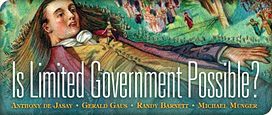In his reply to my post, Tony repeats a common mischaracterization of Nozick’s argument. In Anarchy, State and Utopia, Nozick made no prediction about the emergence of a dominant protection agency. Nor did he describe a mechanism for that emergence. Rather, his argument was that a dominant protection agency could emerge morally without violating anyone’s rights. This moral argument was countered by several contributors to the first issue of the Journal of Libertarian Studies, which you can access here (scroll down to the bottom).
This is not to say that someone might not make the argument that a polycentric constitutional order would eventually evolve into a monopolistic system, but only that Nozick did not make such an argument.
And in my essay, I never claimed that electing the right persons is a practical long term strategy to limit the powers of government. On this issue Tony and I agree. My only point is that engaging in electoral politics to pick the lesser of evils, along with other efforts within the prevailing political structure, is better than doing nothing at all. But many libertarians want more, e.g., a polycentric constitutional order.

